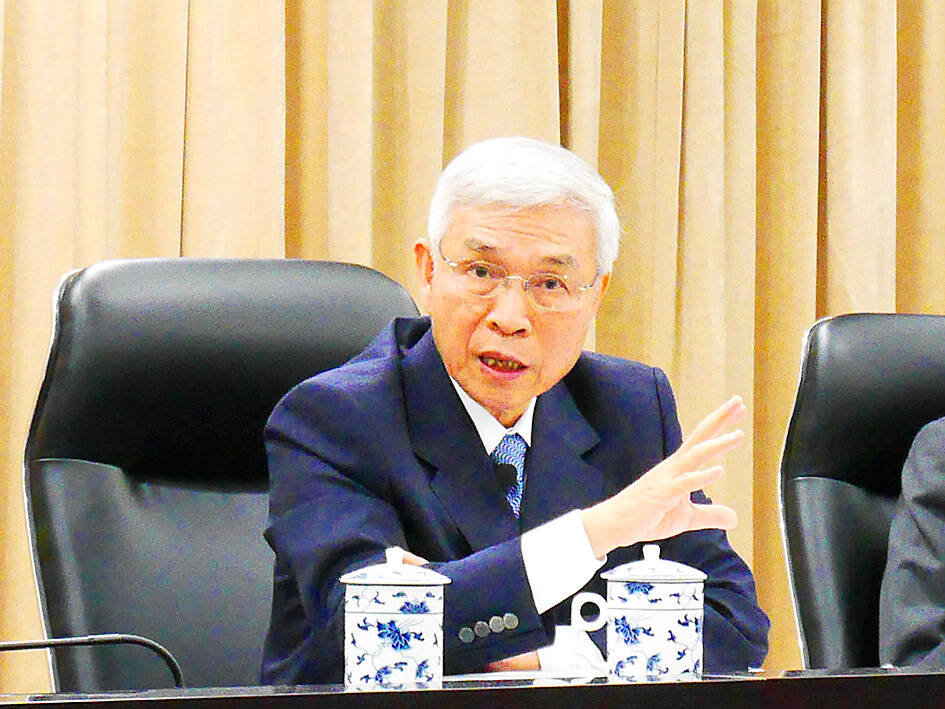Central bank Governor Yang Chin-long (楊金龍) has earned the fourth “A” grade of his career, in an annual report issued by the New York-based Global Finance magazine.
In the Central Banker Report Cards 2023 released by Global Finance overnight, Yang was listed among eight central bankers in the world who received an “A” grade, the magazine said in a statement.
Yang said yesterday that his grade was the result of the efforts made by the government and the people, as well as his colleagues at the central bank.

Photo: Chen Mei-ying, Taipei Times
This year’s Central Banker Report Cards, published annually by Global Finance since 1994, graded the central bank governors of 101 key countries, territories and districts in the world, including the EU, the Eastern Caribbean Central Bank, the Bank of Central African States and the Central Bank of West African States.
Grades are awarded on a scale from “A” to “F” for success in inflation control, economic growth goals, currency stability and interest rate management, with an “A” representing an excellent performance and an “F” signifying outright failure, according to Global Finance.
Yang, who has been working at Taiwan’s central bank since 1989 and became its governor in 2018, received an “A” grade in the annual central banker report in 2019, 2020 and 2022, and an “A-” in 2021.
His predecessor Perng Fai-nan (彭懷南) has the distinction of being the only central banker in the world to have earned the top grade 14 times, gaining straight A’s from 2005-2017.
On the Global Finance 2023 report card, the other central bankers who earned a grade “A” were Brazil’s Roberto Campos Neto, Israel’s Amir Yaron, Mauritius’ Harvesh Kumar Seegolam, New Zealand’s Adrian Orr, Paraguay’s Jose Cantero Sienra, Peru’s Julio Velarde and Uruguay’s Diego Laba, according to the 2023 report.
At the top of the class, three central bankers — India’s Shaktikanta Das, Switzerland’s Thomas J. Jordan and Vietnam’s Nguyen Thi Hong — received an “A+” grade this year, the report showed.
According to Global Finance, 10 central bankers earned an “A-” grade. They are Colombia’s Leonardo Villar, Dominican Republic’s Hector Valdez Albizu, Iceland’s Asgeir Jonsson, Indonesia’s Perry Warjiyo, Mexico’s Victoria Rodriguez Ceja, Morocco’s Abdellatif Jouahri, Norway’s Ida Wolden Bache, South Africa’s Lesetja Kganyago, South Korea’s Rhee Chang-yong and Sri Lanka’s Nandalal Weerasinghe.

NEW IDENTITY: Known for its software, India has expanded into hardware, with its semiconductor industry growing from US$38bn in 2023 to US$45bn to US$50bn India on Saturday inaugurated its first semiconductor assembly and test facility, a milestone in the government’s push to reduce dependence on foreign chipmakers and stake a claim in a sector dominated by China. Indian Prime Minister Narendra Modi opened US firm Micron Technology Inc’s semiconductor assembly, test and packaging unit in his home state of Gujarat, hailing the “dawn of a new era” for India’s technology ambitions. “When young Indians look back in the future, they will see this decade as the turning point in our tech future,” Modi told the event, which was broadcast on his YouTube channel. The plant would convert

‘SEISMIC SHIFT’: The researcher forecast there would be about 1.1 billion mobile shipments this year, down from 1.26 billion the prior year and erasing years of gains The global smartphone market is expected to contract 12.9 percent this year due to the unprecedented memorychip shortage, marking “a crisis like no other,” researcher International Data Corp (IDC) said. The new forecast, a dramatic revision down from earlier estimates, gives the latest accounting of the ongoing memory crunch that is affecting every corner of the electronics industry. The demand for advanced memory to power artificial intelligence (AI) tasks has drained global supply until well into next year and jeopardizes the business model of many smartphone makers. IDC forecast about 1.1 billion mobile shipments this year, down from 1.26 billion the prior

People stand in a Pokemon store in Tokyo on Thursday. One of the world highest-grossing franchises is celebrated its 30th anniversary yesterday.

Zimbabwe’s ban on raw lithium exports is forcing Chinese miners to rethink their strategy, speeding up plans to process the metal locally instead of shipping it to China’s vast rechargeable battery industry. The country is Africa’s largest lithium producer and has one of the world’s largest reserves, according to the US Geological Survey (USGS). Zimbabwe already banned the export of lithium ore in 2022 and last year announced it would halt exports of lithium concentrates from January next year. However, on Wednesday it imposed the ban with immediate effect, leaving unclear what the lithium mining sector would do in the